The summer of 2015 was marked by three major events in China which can hardly be attributed to pure chance: stock markets plummeted, economic growth projections fell far short of the usual, and lives were lost when an explosion at an illegal hazardous material depot rocked Tianjin, an international sea port whose growth had been emblematic of the Chinese miracle.
The contributing factors behind what we must now call a Chinese crisis, as well as its implications for China’s economic performance and political future, have been widely reported on and discussed around the world. My point here is not to paint yet another general picture of the state of the Chinese economy, nor is it to advise Chinese business leaders. Drawing from the present circumstances, my much more modest goal is to put the entrepreneurial drivers of this Chinese miracle in perspective, and reflect on the ways in which entrepreneurs in China can give rise to a replacement economic model for the one which seems to have reached its limits.
The thesis I want to argue here is that if entrepreneurship is capable of contributing to the common good - beyond simply helping the masses partake in consumer society - China is the perfect place to demonstrate this capacity. Four decades of industrialization and globalization have undoubtedly helped lift hundreds of millions of Chinese out of poverty - but this benefit has come at a huge price. Today, the catastrophic magnitude of air, water and soil pollution in China is well documented, so we won’t go over those facts and figures here. The negative consequences of widespread pollution on food safety and the health of local population has also, unfortunately, been well established.
Pollution levels in Chinese cities as well as rural areas is one of the most commonly cited negative consequences of Chinese economic growth, which was in part made possible by the exploitation of natural resources, both domestic or imported and from both mining and agricultural activities. This same growth required the migration of millions of workers from rural areas to urban centers, creating, in the same movement, a mass of second-class citizens in industrial centers, while draining rural China of its lifeblood.
The 1970s: when entrepreneurs were part of the problem
When the public takes to the streets and to social media to voice their refusal of the status quo - a reality created by Deng Xiaoping’s development policies of the 1970s - it’s time to ask how we can change things. But it’s also time to re-examine the Chinese entrepreneur’s role in all of this, before we can talk about how they’ll contribute to a new economic model based on balanced and sustainable growth.
Indeed, the Chinese entrepreneurs of the past decades bear a fair share of responsibility for the current state of affairs. China became the second world economy thanks to a national coalition of local political leaders, thinking only of GDP growth rates, and entrepreneurs focused single-mindedly on the maximization production and profits. A few corrupt bureaucrats were added to the mix and we got this pseudo capitalism that flourishes so long as you keep your eyes closed to the social and environmental consequences. One billion three hundred million Chinese have paid a heavy price for this brand of growth.
Of course, before we load all the blame onto local entrepreneurs and Chinese policies, let’s remember that much of this would not have been possible without the help of Western investors, who financially contributed to the biggest environmental offenders and outsourced to the cheapest bidder, regardless of a manufacturer’s sustainability record.
The 2000s: entrepreneurs become a source of hope
While the first generation of Chinese entrepreneurs strongly supported by the public authorities, flocked to the energy-intensive manufacturing industries, sapped natural resources and generated all kinds of harmful emissions, a new generation of Chinese entrepreneurs has emerged in the 2000s. Its emblematic representatives are Jack Ma, founder of the e-commerce site Alibaba, Robin Li and Eric Xue, co-founders of Baidu, and Ma Huateng, founder of Tencent and its QQ instant messaging system.
The energy of China’s young IT entrepreneurs, the government’s control of the internet, and the goodwill of the Chinese authorities towards national actors has allowed China to enter fully into the Information Age and generate behemoths in this sector. It is clear, however, that despite all the environmental and societal challenges that the country now faces, China has not generated a visible cohort of entrepreneurs geared toward the three 'Ps' of 'people, profits and planet even as the government implements several ambitious sustainable development programs promoting clean and renewable energy.
As far as the distant observer I am can tell, environmental and social issues are still of little interest to the 'big' Chinese entrepreneurs. The research I have done on the subject shows that these issues are still the prerogative of small scale start-ups and local NGOs often acting to provide rural residents with access to drinking water, medical care, or other necessities. These entrepreneurs and NGOs often face hostility from local authorities who don’t appreciate having their problems being pointed out to them.
Without denying the usefulness of local initiatives, there are simply not enough of them to counter the damage done by unbridled capitalism. Food safety; access to healthcare; soil, air and water quality; energy and waste treatment: these are just a few challenges which should be viewed as opportunities for responsible - and ambitious - entrepreneurs.
Mr. Zhang Yue, founder of the Broad Group, is an anomaly among the ‘big’ Chinese entrepreneurs. The company he founded in 1988 employs over 10,000 people and earns more than one billion US dollars in revenue.
When his company began operations, it manufactured non-electric air conditioning systems. But since then, the company has diversified into sustainable construction and air quality solutions. Drawn to sustainable solutions relatively early-on in his entrepreneurial career, Mr. Zhang does not undertake any project likely to go against this principle. For example, his company has never manufactured electric air conditioning systems despite the insistence of the Chinese authorities and the existence of a huge domestic market. Because electricity in China is still overwhelmingly generated by coal, Mr. Zhang refused to market products that would have made Chinese air even less breathable.
His decision to enter the construction industry was taken in the aftermath of the deadly Chinese earthquake of 2008. And today, he’s demonstrating that it’s possible to construct more sustainable residential and office building, while simultaneously reducing construction costs, consuming less energy, and having a minimal impact on air quality. Knowing that buildings are globally responsible for almost 40% of CO2 emissions, it is understandable why Mr. Zhang wanted to make a difference in this industry.
In recognition of his contributions to sustainable development, Mr. Zhang has made a name for himself on the international stage. He does not, however, generate the same admiration in China, where the most recognizable names in entrepreneurship are the same founders of Lenovo, TCL, Alibaba, Tencent, and Baidu mentioned earlier. In my opinion, the Broad Group is not as iconic as it should be at home.
Looking towards the future
Still, China desperately needs hundreds - perhaps even thousands - of entrepreneurs like Mr. Zhang: individuals with the courage to initiate positive change and breath new life into an old economic model that has run out of steam. Ironically, and this is good news for the Chinese, it’s when change seems impossible that truly innovative solutions are born. If the Chinese authorities give incentive where it is needed, China could become the source of innovative solutions, rather than a source of so many environmental and social scandal.
The Chinese government is increasingly aware that their current top-down, bureaucratic economic model, will not suffice to ensure future growth. In July, they took steps to promote ‘mass’ entrepreneurship. We can only hope that this program will not help to feed unbridled capitalism, but rather encourage a new cohort of responsible entrepreneurs. The future of China - and of humanity as a whole - depends on it.
From the ESSEC Knowledge Magazine: 









